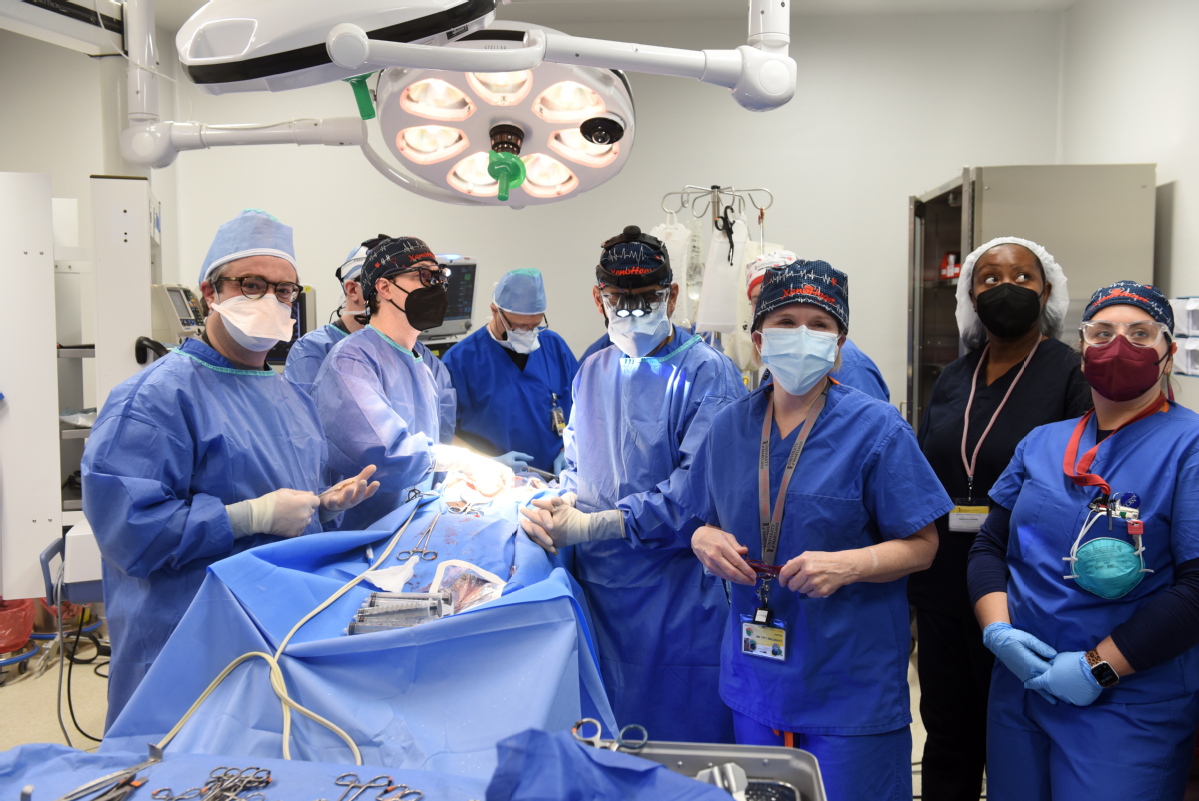US man recovering after pig heart transplant


An American man with life-threatening heart disease who received a genetically modified pig heart during a groundbreaking operation is recovering well, according to doctors.
David Bennett, 57, from Maryland, on Friday underwent the first-of-its kind surgery by a team of doctors at the University of Maryland Medical Center in Baltimore. The operation lasted eight hours.
Dr Bartley Griffith, who surgically transplanted the pig heart into the patient, said in a statement: "This was a breakthrough surgery and brings us one step closer to solving the organ-shortage crisis. There are simply not enough donor human hearts available to meet the long list of potential recipients.
"We are proceeding cautiously, but we are also optimistic that this first-in-the-world surgery will provide an important new option for patients in the future."
Doctors were able to do the operation because of advances in gene editing tools that modified the pig. making it more suitable to be used in a human.
Before his surgery, Bennett described how using a pig heart was among his last options for a heart transplant as he was too sick for a human heart and would likely die.
"It was either die or do this transplant. I want to live. I know it's a shot in the dark, but it's my last choice," he said in a statement.
Bennett is among 110,000 Americans who are on the waiting list for an organ transplant, according to organ-donation statistics from the US Department of Health Resources and Services Administration. More than 600 people die each year because they can't get a transplant.
Bennett is still using a heart-lung bypass machine to stay alive following his surgery. He was using it before his operation.
He is being closely watched by doctors in case his body rejects the new organ and to see if he develops any infections such as porcine retrovirus, a pig virus that can pass to humans.
The modified pig heart was created by a regenerative medicine company called Revivicor in Blacksburg, Virginia. It kept the pig heart in controlled conditions until the morning of the surgery.
The pig was genetically modified 10 times to make it appropriate for the operation. Researchers were able to knock out four genes that would cause a human to reject a pig heart when transplanted. A growth gene was eradicated to prevent the pig's heart from continuing to grow after it was implanted.
They also identified six human genes that regulate immune acceptance and they were inserted into the pig's genome.
Bennett was also given a drug made by Kiniksa Pharmaceuticals in Lexington, Massachusetts, to help prevent his body from rejecting the pig heart.
Pigs are near perfect for heart transplants because they have similar-sized hearts to humans.
When a hog is killed, its heart is the same size as that of an adult human.
Xenotransplants (animal to human transplants) were first tried in the 1980s.
But they were soon stopped after a famous operation on Stephanie Fae Beauclair, also known as "Baby Fae", at Loma Linda University in California.
Baby Fae was born with a fatal heart condition and received a baboon heart transplant, but she died within a month after her immune system rejected the heart.
For the experimental surgery on Bennett to be done, the University of Maryland Medicine had to get emergency authorization from the US Food and Drug Administration on Dec 31.
Dr Muhammad Mohiuddin, head of the university's program on xenotransplantation, which transplants animal organs into humans, said, "The FDA used our data and data on the experimental pig to authorize the transplant in an end-stage heart disease patient who had no other treatment options."
The experiment was partially funded by a $15.7 million research grant to evaluate Revivicor's genetically modified pig hearts in baboon studies.
When Bennett told his son, David Bennett Jr, that he intended to get a pig's heart transplant, he was surprised, according to The New York Times.
Bennett Jr from Raleigh, North Carolina, told the Times: "At first I didn't believe him. He'd been in the hospital a month or more, and I knew delirium could set in. I thought, no way, shape or form is that happening."
His father had previously had a pig's valve inserted about a decade ago.
Pig's valves have been successfully used for years in human hearts.

































